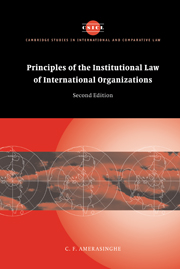Book contents
- Frontmatter
- Contents
- Preface
- List of abbreviations
- Table of cases
- 1 Introduction
- 2 Interpretation of texts
- 3 Legal personality
- 4 Membership and representation
- 5 Non-Judicial organs of organizations
- 6 Acts of non-judicial organs: their legal effect
- 7 Acts of non-judicial organs: the doctrine of ultra vires
- 8 Judicial organs
- 9 The internal law: employment relations
- 10 Privileges and immunities
- 11 Financing
- 12 Responsibility to and of international organizations
- 13 The liability of member states vis-à-vis third parties
- 14 Amendment of constitutions
- 15 Dissolution and succession
- 16 The settlement of disputes
- Index
- Cambridge Studies in International and Comparative Law
6 - Acts of non-judicial organs: their legal effect
Published online by Cambridge University Press: 10 December 2009
- Frontmatter
- Contents
- Preface
- List of abbreviations
- Table of cases
- 1 Introduction
- 2 Interpretation of texts
- 3 Legal personality
- 4 Membership and representation
- 5 Non-Judicial organs of organizations
- 6 Acts of non-judicial organs: their legal effect
- 7 Acts of non-judicial organs: the doctrine of ultra vires
- 8 Judicial organs
- 9 The internal law: employment relations
- 10 Privileges and immunities
- 11 Financing
- 12 Responsibility to and of international organizations
- 13 The liability of member states vis-à-vis third parties
- 14 Amendment of constitutions
- 15 Dissolution and succession
- 16 The settlement of disputes
- Index
- Cambridge Studies in International and Comparative Law
Summary
There are two important problems of legal principle relating to the acts of organizations. The first concerns the applicability, scope and effect of the doctrine of ultra vires in regard to these acts. The second relates to the effects of acts performed by organs of organizations, such as the General Assembly of the UN, the Executive Directors of the IBRD, the deliberative assemblies of the FAO or the ILO and the secretariats of international organizations. The second matter will be discussed here, while the first problem will be dealt with in the next chapter.
The legal effect of the acts of organs of organizations, and consequently of organizations, is a matter which has exercised jurists for some time. While most attention has been paid to the resolutions of the General Assembly of the UN, there has been work done on other organizations. It is not the purpose here to discuss in detail the legal or other effects of acts of the organs of all organizations but to identify any general principles which may apply to what may be described generally as resolutions (or decisions) of organs. Inevitably, the UN will be the basic model but any general principles would apply to other organizations.
A principle which seems to be basic is that the power to perform acts is derived from the constitution of an organization, whether such power is explicit or implied. Consequently, the legal effect of these acts should depend on the constitutional provisions in question.
- Type
- Chapter
- Information
- Publisher: Cambridge University PressPrint publication year: 2005



